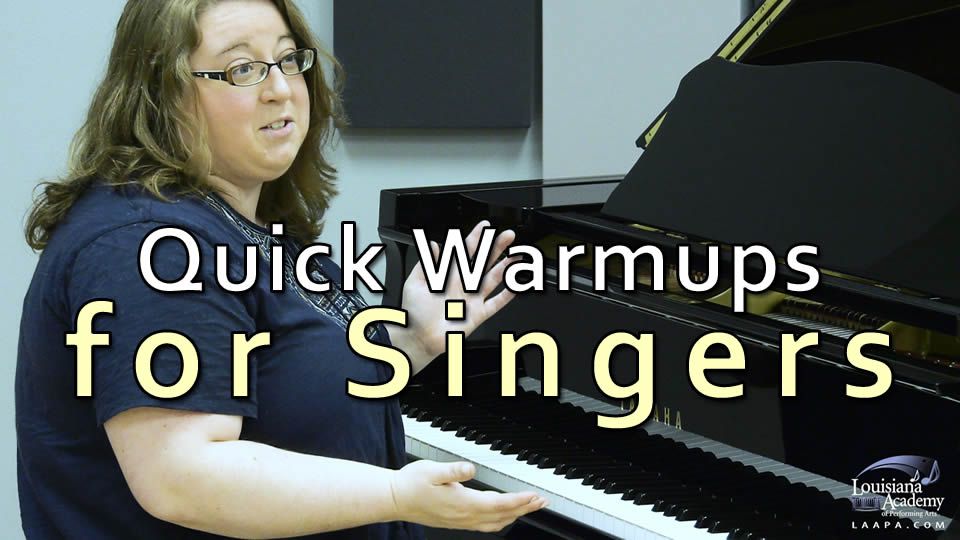Vocal Coaching for Singers
Mrs. Jennifer shows you how to warmup for your next lesson or performance on stage!
Vocal Warmups for Singers
- contributed by Jennifer H.
(00:07): Hi, my name is Jennifer Hoover. I teach voice and piano on faculty here at the Louisiana Academy of Performing Arts in Mandeville. Today I'd love to show you some easy and safe ways to warm up your voice when maybe you've just woken up and you're on the way to a rehearsal, or you have to be somewhere in a hurry and you just don't have time to warm up as you normally would sitting at the piano.
(00:30): So in order to really take care of your voice you need to warm it up before you start to sing, especially full voice with full volume and force behind it because it's a muscle, it's the vocalists muscle. Just like any other muscle in your body you want to stretch it, get it ready to move before you try and use it full on. Just like if you were going for a run you'd stretch first and after.
(00:53): So what's a good idea to do start with, especially if your voice hasn't been awake long, it's a little bit of a hum and you want a nice open mouth with your lips closed. I mean, obviously I'm using the piano because I have it here. You may not have that luxury if you're on the go, but you may have a piano app on your phone, or you may be able to just get a quick pitch. Even if you can't, you can start where your voice feels comfortable without straining. If you're really froggy, say it's sinus season, like it is now, and you're way down in the basement when you first wake up sounding like a bass and you're normally a soprano one, you may not want to start down in the most comfortable part because it won't be your natural range. Does that make sense?
(01:47): So what you want to do is start somewhere sort of in the mid range, I'm starting at a middle C right now, but you can just find it how it feels comfortable in your voice. Right there, that's good. Just a couple of pitches up and down and try going a little higher and lower in your range. If you know how to listen for half steps, go by half steps Then go up a half step. You might try humming a small melody, very gently along with a song on the radio, but again, don't sing full out.
(02:22): The next thing I really like to do is to get my breath activated and my muscles, my diaphragm and my things that keep my breath moving that's really important for singing. When you're not awake, sometimes your body isn't awake either. So a really good way for that, my favorite warm up for that is called the lip buzz. You just buzz your lips and you have to sing while you're doing it and generally I try and do it in about this pattern.
(02:50): Easy to do no matter where you are. Pick a note to start on, go up about five notes and come back down and you can do that by half steps as well. So on and so forth, once your voice gets a little bit more warmed up, there's something that I like to do called the buzz siren. You may have heard of the vocal warmup called the siren where you just make your lowest to highest note as loud and fast as you can, just to kind of, it's almost like a vocal stretch or yawn. But it's a little bit overly active, honestly, in the voice and in the body for when you've just gotten started for the day.
(03:29): So if you've got about midway to where you feel ready to sing full out and you need to warm up, especially that upper range, this is a great exercise because it's difficult to have tension when you are buzzing your lips because your face is very busy. So you're not going to bring in any of that tired, crooked neck from when you were sleeping or anything like that. So you want to just do the same thing, a lip buzz, and you're going to do it from the lowest to the highest sound you can make starting somewhere in the middle. You might sound crazy to some of your friends, singers are strange that's okay. If you want to make beautiful music sometimes you have to work hard to get there and these are just a couple of the tips that I like to use when I need to warm up in a hurry.
(04:15): Thanks so much for watching. We'll see you next time.
